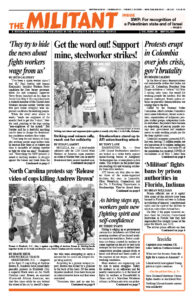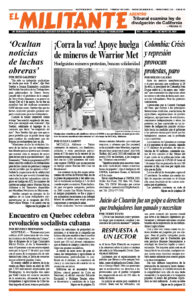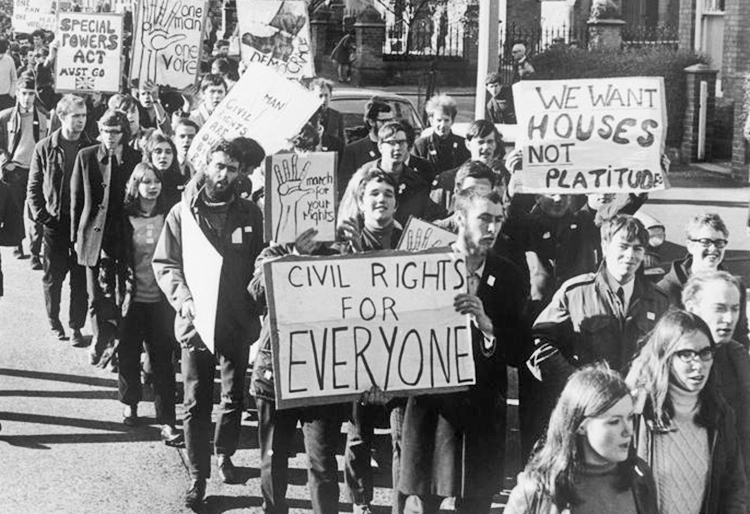LONDON — Social and political turmoil came to the surface in Northern Ireland days before the April 28 resignation of Arlene Foster as its first minister. As is the case elsewhere in the United Kingdom, working people face the carnage of capitalist decline and joblessness that has intensified during the pandemic.
Forced out of office by members of the Northern Ireland Assembly, Foster’s resignation registers the deepening crisis of the parties that defend the province’s union with Britain. Her decision to quit was precipitated by sharpening conflicts within her Democratic Unionist Party, including over her acquiescence to London’s Brexit deal with the European Union, negotiated by Prime Minister Boris Johnson.
That deal led to customs checks on imports and exports between Northern Ireland and the rest of the U.K., but maintained an open border for trade between Northern Ireland and the Irish Republic. In January the ensuing trade disruption resulted in working people facing shortages in supermarkets, while cross-border Ireland trade, investment and border crossings continue to grow.
The effects of the Brexit agreement were one of the targets of days of rioting by youths in predominantly Protestant areas of Belfast, Derry, Newtownabbey and Carrickfergus in April. The bourgeois press blamed the rioting on state prosecutors’ decision not to charge Irish nationalists for flouting pandemic lockdown restrictions at a funeral. Events commemorating the 1921 incorporation of Northern Ireland into the U.K. have been cancelled. Much-weakened pro-British former paramilitary forces in these areas foster sentiment that the province’s Protestants have been “betrayed” by the main unionist parties. The electoral base of the Democratic Unionist Party and the Ulster Unionist Party have eroded and new outfits have emerged.
The current crisis coincides with the 100th anniversary of the partition of Ireland, imposed by London after a war of independence liberated the majority of the country from British rule. Through partition, Britain’s rulers sought to minimize the loss of the Irish Republic, shore up their dwindling world role, and entrench their domination over the most profitable industries in the North. Through divide and rule, pitting Protestants against Catholics, London aimed to undermine working-class solidarity and struggle in both Ireland and the U.K.
Massive struggles in the Six Counties of Northern Ireland against anti-Catholic discrimination in employment, housing, education and political representation exploded at the end of the 1960s. The civil rights movement gained support of working people in the South and internationally.
Failure to crush civil rights fight
In 1969 the U.K.’s Labour government sent troops to the North in an attempt to repress these mobilizations and prevent them threatening the British rulers’ hold over their prized possession. During the ensuing conflict, London interned thousands without trial, silenced Irish nationalist leaders and unleashed deadly violence against protesters demanding civil and national rights. Nonetheless, the nationalists fought back and scored some victories.
The 1998 Good Friday Agreement between London, Dublin and political parties in Northern Ireland registered some of these gains. Through these battles most anti-Catholic discrimination was reversed and the British rulers dismantled much of their repressive apparatus across the province.
The agreement kept Northern Ireland in the United Kingdom. Divide and rule was perpetuated with so-called peace walls — some 100 physical barriers that still separate areas where Catholics or Protestants predominate in Belfast and other towns — and segregated education continued. But huge blows were dealt to sectarian divisions among working people.
At the same time the agreement marked the weakness of British imperialism and gave a boost to all-Ireland capitalist development. It established a Northern Ireland Assembly that would collaborate with the government of the Irish Republic on cross-border issues.
Much of the industry in the North, so precious to British capital a century ago, is in terminal decline. Foreign investment has sought new industries in the South and cross-border trade and investment has grown. The weighty agricultural sector has always had an all-Ireland character.
Sinn Fein, a bourgeois nationalist party that was a key force in the civil rights struggle, has made electoral gains in the Republic. These come at the expense of the Fianna Fail and Fine Gael parties, which are currently in a coalition government with the Greens.
“The United Kingdom of Great Britain and Northern Ireland is looking anything but united,” opined the editors of the Sunday Times May 2 on the eve of the 100th anniversary.
“London’s rule over Northern Ireland should be ended now,” Andrés Mendoza, the Communist League candidate for London mayor, told the Militant May 3. For decades the CL has fought unconditionally for Irish self-determination. “This is in the interests of working people in Ireland and Britain. It should be fought for by the labor movement in the U.K., paving the way to unite workers and farmers in struggle, along the road to a workers and farmers government in each country.”


